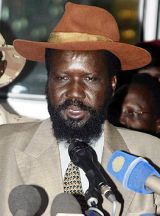Kiir vows unity after becoming Sudan’s new VP
KHARTOUM, Aug 11 (AFP) — Salva Kiir was sworn in as Sudan’s first vice president Thursday after the death of his predecessor John Garang, pledging to follow his legacy and work for peace and unity in the war-ravaged country.
 “We really want our country to remain united,” Kiir said at a low-key ceremony in Khartoum where security was tight after several days of deadly rioting that greeted Garang’s death.
“We really want our country to remain united,” Kiir said at a low-key ceremony in Khartoum where security was tight after several days of deadly rioting that greeted Garang’s death.
Kiir, 54, took office less than two weeks after Garang was killed in a helicopter crash that raised fears for the future of a peace deal that ended 21 years of war between southern rebels and the government in Khartoum.
“I shall protect the sovereignty of the country,” said Kiir, a known separatist who led the military wing of Garang’s Sudan People’s Liberation Movement/Army (SPLM/A)
“I shall protect the country’s decentralized system… and preserve unity… as God is my witness,” he said. “I wish to call on all Sudanese to engage in a process of national healing.”
He emphasized the need for “tolerance of others, of all views and of all faiths” in line with Garang’s dream for a democratic and prosperous Sudan.
One of his primary challenges will be to form a national unity government with former arch-foe President Omar al-Beshir, a process interrupted by Garang’s death just three weeks after he became vice president under the January 9 accord.
Kiir, who replaced Garang as SPLM/A head, will also have to help solve disputes surrounding oil-rich areas on the north-south border.
He is also to continue talks with several Khartoum-backed southern militia chiefs with a view to rallying them to the peace agreement that ended Africa’s longest running conflict.
“The Comprehensive Peace Agreement is not a bed of roses, and even a bed of roses had thorns. Let’s join hands to see that full participation in the process is ensured,” he said.
But Kiir warned that full peace would not be achieved if Sudan remained mired in conflict in its western Darfur region and the volatile east.
“Comprehensive peace requires the quick resolution of Darfur and eastern Sudan,” he said.
A government crackdown on an uprising by black minority rebels in Darfur has left 300,000 people dead and more than two million homeless.
Beshir too pledged to resolve the problem of Darfur “in the shortest possible time so that the refugees and displaced can return to their homes.
He added: “The peace agreement will not be affected by the death of life of anybody and as Garang said, it is owned by the people.”
The ceremony at Khartoum’s Republican Palace was brief and low-key compared to Garang’s lavish swearing-in less than a month ago, and was followed by chanting and dancing.
The United States, which invested much political capital into securing the January pact, has expressed confidence in the SPLM/A and Kiir’s ability to uphold the deal.
A key point of argument is oil, and UN special envoy Jan Pronk has urged Kiir to push for a quick resolution of territorial quarrelling over oil-rich areas in central Sudan.
Until a 2011 referendum on secession is held, oil wealth is to be shared and concessions awarded by a joint commission. Most oil fields lie in the south.
Southern residents will be asked at the end of a six-year period whether they want to secede from the north.
Even though some elements of the deal have been delayed, such as the formation of a reconciliation cabinet and an autonomous government in south Sudan that were due to be installed by August 9, important aspects have already been implemented.
These include the enforcement of a permanent ceasefire and the drafting and ratification of a six-year interim constitution.
During the first four years of the interim period and until general elections are held, Beshir’s National Congress Party will have 52 percent of executive posts and legislative seats and the SPLM 28 percent.
Fourteen out of the remaining 20 percent will go to northern opposition parties, with the final six percent split among other southern groups.
